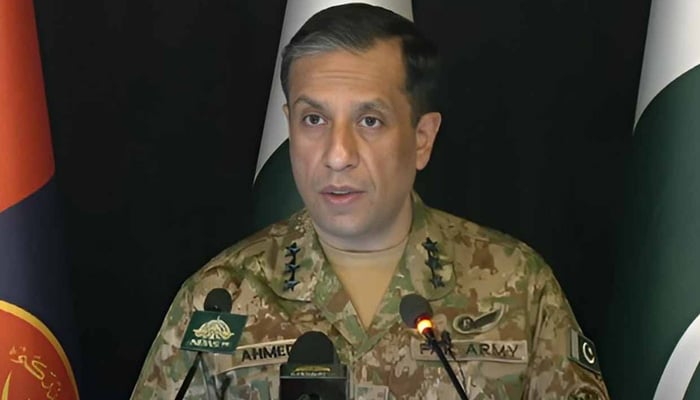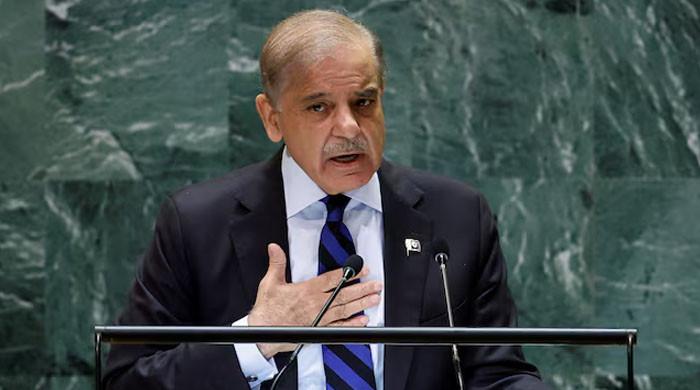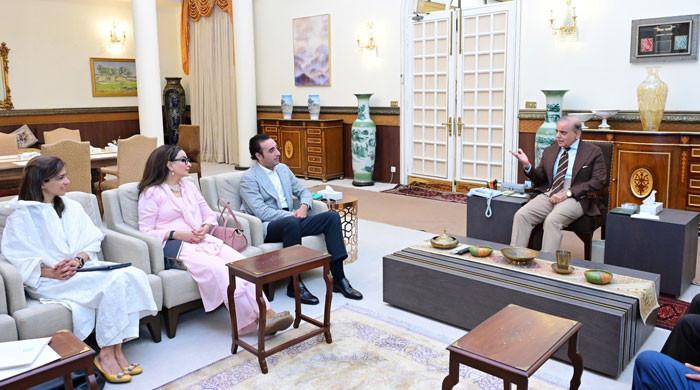 DG ISPR Lieutenant General Ahmed Sharif. — ISPR
DG ISPR Lieutenant General Ahmed Sharif. — ISPR- DG ISPR says Kashmir remains a disputed territory under UN resolutions.
- Pakistan handled situation wisely, avoided escalation: Lt Gen Chaudhary
- Military pledges stronger response to any repeat of aggression by India.
Director General of the Inter-Services Public Relations (DG ISPR) Lieutenant General Ahmed Sharif Chaudhry has dismissed the notion that India could block Pakistan’s water supply as “insane thinking”.
In an interview with Al Jazeera, the spokesperson of armed forces said, “Only a mad person can think that India can stop Pakistan’s water. It is not possible to cut off water for 240 million people.”
Indian Prime Minister Narendra Modi on Thursday said that Pakistan will not get water from rivers over which India has rights. The statement came a month after a deadly attack in Indian Illegally Occupied Jammu and Kashmir (IIOJK) led New Delhi to suspend a key river water-sharing treaty between the neighbours.
Responding to the comment, DG ISPR pointed out that six rivers originate from the Kashmir region and that, under United Nations resolutions, Kashmir remains a disputed territory.
“If the people of Kashmir decide to join Pakistan, all those rivers will belong to us, making India a lower riparian state,” he explained. “At that point, it will be for Pakistan to decide how to deal with that situation.”
New Delhi unilaterally suspended the Indus Waters Treaty (IWT), an agreement negotiated by the World Bank in 1960, among a slew of measures announced by India against Pakistan last month after the April 22 attack that killed 26 men, mostly Hindu tourists.
Lt Gen Chaudhry emphasised the unity and resilience of the Pakistani people. “If you go into the streets and cities of Pakistan, you will find the answer written on the faces of the people,” he said, adding that the conflict is not just political or military, but a battle of truth and principle.
Calling Pakistan’s Marka-e-Haq a “a just struggle,” the military spokesperson said Pakistan has exposed falsehoods, deception, coercion, and Indian aggression. He referenced the events following the Pahalgam incident, stating that India constructed a fabricated narrative.
“In response, Pakistan made one simple demand: if you have evidence, bring it forward,” he said. “If there is any proof connecting a Pakistani citizen or the state to the incident, present it — not just to us, but to the international community or a neutral and trusted third party, so that transparent investigations can take place.”
He noted that India has failed to respond to this demand. “India had no answer then, and it still has none,” he said, adding that just days ago, India’s Ministry of External Affairs admitted the investigation was ongoing.
Commenting on India’s actions on May 6 and 7, Lt Gen Chaudhry said, “They do not have any moral justification for what they did.” He criticised India’s handling of the situation, saying the world witnessed how the Indian media and state spread falsehoods in the information war.
India launched unprovoked missile strikes at multiple sites within the Pakistani territory on the night of May 6 and 7, in what it said was targetted at militant camps linked to the Pahalgam attack in against the killing of tourists in the IIOJK. The Indian strikes killed several Pakistani civilians including women and children.
In response, the Pakistan armed forces launched a large-scale retaliatory military action, named "Operation Bunyan-um-Marsoos", and targeted several Indian military installations across multiple regions.
Pakistan Air Force downed six Indian fighter jets, including three Rafales, and dozens of drones. After at least 87 hours, the war, provoked by India, ended on May 10 with a ceasefire agreement brokered by the United States.
Lt Gen Sharif said that India possesses a much more developed theatre and film industry than Pakistan, and that this has allowed it to continuously craft new narratives, in reference to the false accusations against Islamabad linked to the Pahalgam attack.
The DG ISPR said that Pakistan has not yet used the full strength of its conventional forces, adding that a major portion of country’s military is focused on countering India-backed terrorism, particularly in Balochistan and Khyber Pakhtunkhwa.
'India biggest sponsor of terrorism'
"The world knows that India is the biggest sponsor of terrorism in this region," Lt Gen Chaudhry said. He emphasised that Pakistan has not withdrawn any troops from these operations and has not yet revealed its full technological capabilities.
He warned of the dangers of conflict between two nuclear-armed nations. “Global powers understand that even imagining a war between two nuclear states is both dangerous and ridiculous,” he said. “India has been obsessed with war for years, which is like playing with fire.”
He criticised India for creating a situation that could lead to mutual destruction. In contrast, he said, Pakistan has handled the situation wisely and avoided escalation. “A ceasefire means both sides have stopped firing,” he clarified, “but peace will only come when India abandons its war-driven political mindset.”
Lt Gen Chaudhry also raised concerns about human rights violations in India. “The Indian elite believes in oppressing Muslims and minorities, which is a serious issue,” he said. He added that not only Muslims but also Christians, Sikhs, and lower-caste communities face persecution in India.
“This oppression naturally triggers a reaction,” he noted, “but instead of addressing the root causes, India refuses to deal with the issues and blames Pakistan.”
He said such reactions are the inevitable result of extremism and the Hindutva ideology. “India tries to turn its internal problems into an external issue by blaming Pakistan,” he said. “But until India resolves these internal problems, peace will not be possible.”
He questioned the logic behind alleged targeting a holy place like the Golden Temple, calling the accusation “the greatest lie.” Lt Gen Chaudhary reaffirmed Pakistan’s commitment to safeguarding Sikh religious sites such as Nankana Sahib, Panja Sahib, and Kartarpur Sahib.
“Attacking religious or civilian sites is against our culture, our values, and our religion,” he said, reiterating that Pakistan’s stance remains rooted in its moral and ethical principles.
“We love our Sikh brothers, and there are deep bonds between Muslims and Sikhs in Pakistan,” he added.
'Pakistan will give stronger response to any repeat of aggression'
The military spokesperson said that Pakistan has fought its war independently and expects India to do the same. “If India has any self-respect, it should also fight its own battles.”
He urged the Indian public to learn the value of self-reliance and to stop depending on falsehoods and aggression. “Indians must stop relying on lies and aggression,” he added.
Referring to the recent escalations, Lt Gen Chaudhary said that India committed open aggression while Pakistan stood firm then, and is standing firm today.
He warned that any repeat of such aggression by India would be met with an even stronger response. “If India tries this again, our reaction will be swifter and more severe than before,” he concluded.
.png)




